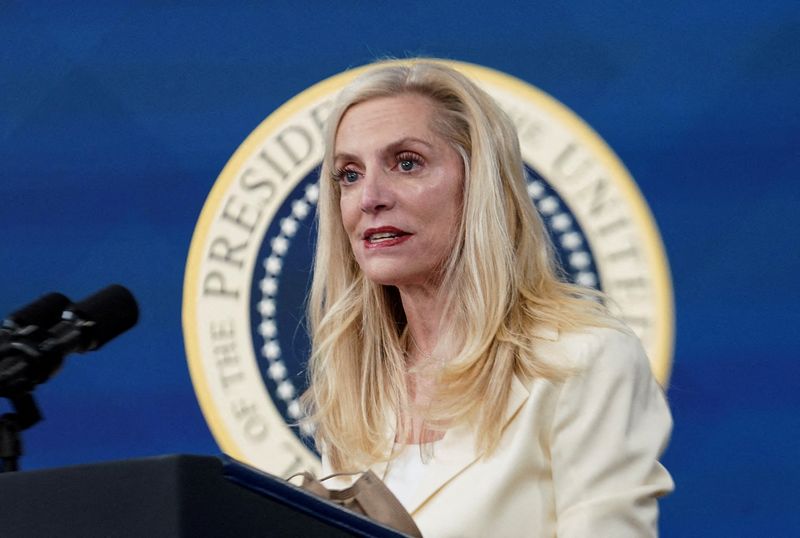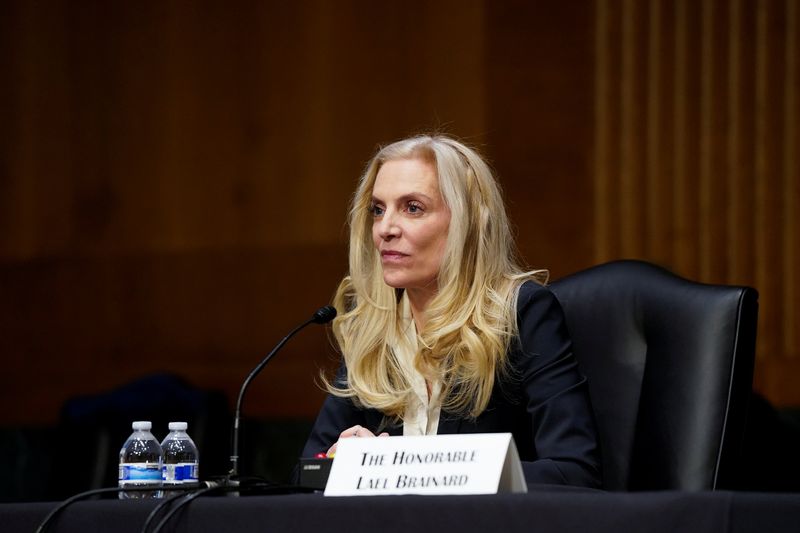By Andrea Shalal, Steve Holland and Lindsay (NYSE:LNN) Dunsmuir
(Reuters) -President Joe Biden on Tuesday picked Federal Reserve Vice Chair Lael Brainard and White House economist Jared Bernstein as his top economic advisers, part of a fresh push by the Democratic president to convince skeptical Americans his economic policies are working.
The decision, announced after financial markets closed, gives Biden a pair of trusted Washington insiders to steer economic policy as the risk of recession fades but inflation lingers. Big fights also loom with the Republican-controlled House of Representatives over raising the debt ceiling.
Biden named Brainard director of the National Economic Council (NEC) to replace Brian Deese, who announced his departure this month, and said he would nominate Bernstein to replace the outgoing chair of the Council of Economic Advisers (CEA), Cecilia Rouse, the first Black American in that post, who will return to Princeton University. Bernstein already serves on the CEA.
"Lael and Jared will help bring a seriousness of purpose to the task of building a strong, inclusive, and more resilient economy for the future," Biden said in a statement, underscoring the new team's focus on achieving a soft landing amid the Federal Reserve's continued raising of interest rates to rein in inflation, building an inclusive economy, and helping U.S. businesses thrive and become more competitive.
The shakeup comes as the White House tries to tackle what officials view as a frustrating disconnect between relatively strong economic data and weak public sentiment.
Biden's approval ratings dropped 6 percentage points to 36% in a new Reuters/Ipsos poll, despite unemployment at 53-year lows and rising consumer sentiment.
Biden also handed a new job title, adviser for strategic economic communications, to deputy NEC director Bharat Ramamurti, former adviser to Senator Elizabeth Warren and vocal critic of oil and gas companies' windfall profits.
Current CEA member Heather Boushey was named chief economist in Biden's new "Invest in America" cabinet, and Labor Department chief economist Joelle Gamble one of Brainard's deputies.
Biden is expected to soon name a replacement for Brainard, who supported recent rate raises to tame inflation while noting the impact corporate profit margins have on rising prices. Any Fed nominee will be subject to Senate approval.
In his State of the Union Speech last week, Biden doubled down on pledges to rout "trickle down" economics from policymaking and blasted companies for profiteering. His new economic crew may spend less time shaping new policy and more time overseeing more than $1 trillion in new federal spending on semiconductor manufacturing, infrastructure and green tax credits.
Faiz Shakir, chief political adviser to Senator Bernie Sanders, said Biden's picks for the top economic jobs were "not everything we as progressives want," but welcomed moves to "challenge unchecked corporate power."
DEBT LIMIT FIGHT
One of the biggest challenges for Biden's White House will be staving off a U.S. debt default in the face of a hostile House of Representatives now controlled by Republicans who say they will not agree to raise the statutory debt ceiling without cutting future spending. The White House has refused to discuss spending cuts without a debt ceiling vote first.
Treasury Secretary Janet Yellen said on Jan. 19 that the United States has reached its current $31.4 trillion borrowing cap, but can keep paying its bills until June by shuffling money between accounts. Investors have warned that edging closer to the deadline could have dire market repercussions.
Bernstein, whom Biden described as a "brilliant thinker," told a think tank event in Washington last week that Republican efforts to "weaponize" the debt limit were "especially reckless" with the economy slowing and inflation still coming down.
Both he and Brainard have argued that labor market disparities are curbing U.S. growth potential; neither has in-depth experience negotiating with hostile lawmakers.
Bernstein last week conceded that the White House's early description of inflation as "transitory" had missed the mark. He said the administration was closely watching energy prices, citing tight refinery capacity and China's reopening as possible pressure points.
BRAINARD LEAVES HOLE AT FED
The Fed is trying to achieve a "soft landing" for the economy that involves tamping down inflation without causing a recession. On Tuesday, data showed consumer prices in January posted their smallest annual rise since October 2021, a sign that goal is in sight.

Brainard, a Harvard-educated economist and a Democrat described by Biden as a "trusted veteran," is known at the central bank for thorough preparation and particular expertise on global economics. During almost a decade there, she extended her influence across both monetary policy and financial regulation.
Biden's decision in late 2021 to renominate Fed Chair Jerome Powell, a Republican, to the top position was twinned with Brainard's elevation to the No. 2 slot, ensuring a counterweight on monetary policy and regulation. A bane of Wall Street, Brainard has pushed the Fed to take more actions on requiring banks to account for risks of climate change and also backed a central bank digital currency.
